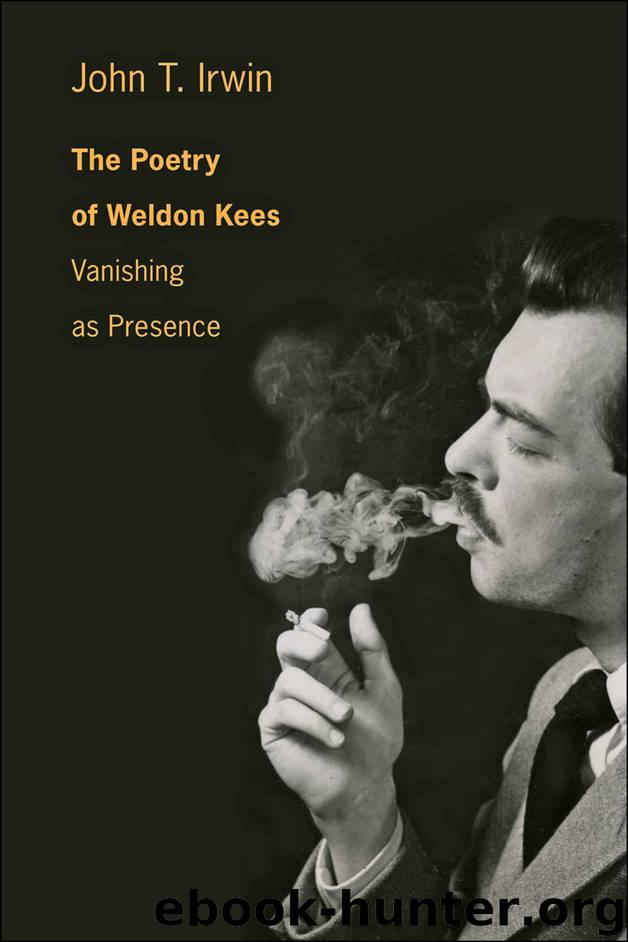The Poetry of Weldon Kees by John T. Irwin

Author:John T. Irwin [Irwin, John T.]
Language: eng
Format: azw3
Publisher: Johns Hopkins University Press
Published: 2017-05-21T04:00:00+00:00
Weldon Kees on the Brooklyn Bridge, November 1948. Photograph by Norris Getty, courtesy of the Gertrude Stein Gallery.
This association of Brooklyn Heights with Crane—another poet who had drowned himself and whose body, never recovered, was never to end up as debris cast on shore by the tide—sets up the final image of “Travels in North America.” The speaker is suddenly brought back into the present from his memory of Brooklyn Heights ten years earlier and, contemplating another map, says,
Hart Crane on the roof of 110 Columbia Heights, Brooklyn, c. 1924, the Brooklyn Bridge behind him. Courtesy of Columbia University Libraries, Rare Book and Manuscript Library.
Here is Milpitas,
California, filling stations and a Ford
Assembly plant. Here are the washboard roads
Of Wellfleet, on the Cape, and summer light and dust.
And here, now textured like a blotter, like the going years
And difficult to see, is where you are, and where I am,
And where the oceans cover us. (Kees, Collected 118)
The image of “the washboard roads / Of Wellfleet, on the Cape, and summer light and dust” recalls the fact that though the Keeses lived most of the year in Brooklyn Heights they would drive to Cape Cod to spend the summer in Massachusetts. And having traversed North America from the Atlantic coast to the Pacific, Kees registers the fact that the characteristic American solution to temporal problems—the spatial solution of going West and starting over—doesn’t work anymore. Like so many of the longer (of more than one page) poems in the last volume—e.g., “The Hourglass,” “The Testimony of James Apthorp,” “Saratoga Ending”—the one entitled “Travels in North America” is the monologue of someone who is coming to the end of his rope, the kind of poem that is typical of late Kees.
One of the best poems in Kees’s last volume is “Guide to the Symphony,” a parody of the kind of note that one reads in a concert program. The poem begins with a description of the instruments employed in the work—“Three flutes, two oboes, English horn, violins”—a typical list that ends with a direct comic observation: “And a contra-bassoon played by a worn-looking blonde” (Kees, Collected 106). Part of the poem’s wit depends on the attempt to describe in words an art that is essentially non-verbal, and the lengths the author goes to to inject into his piece things that can be described in words even though they may have only a tangential relation to the symphony. Noting that the work is “classical in form,” the speaker of the poem then proceeds to give a verbal reading of what the music means: “A wayward dance proceeds; the woodwind voices and the strings / Unite in agitato passages that state, // Some critics believe, ‘Man’s long revolt against the Higher Will.’ ” Oscillating among several registers the poem’s speaker notes that after “Staccato notes, fortissimo, engage the clarinets”: “The work is dissonant, ‘though not excessively.’ ” Adapting the style of a program note, the poem’s speaker mixes comments on instrumentation (always enclosed in parentheses)
Download
This site does not store any files on its server. We only index and link to content provided by other sites. Please contact the content providers to delete copyright contents if any and email us, we'll remove relevant links or contents immediately.
4 3 2 1: A Novel by Paul Auster(12392)
The handmaid's tale by Margaret Atwood(7763)
Giovanni's Room by James Baldwin(7346)
Asking the Right Questions: A Guide to Critical Thinking by M. Neil Browne & Stuart M. Keeley(5775)
Big Magic: Creative Living Beyond Fear by Elizabeth Gilbert(5771)
Ego Is the Enemy by Ryan Holiday(5447)
The Body: A Guide for Occupants by Bill Bryson(5096)
On Writing A Memoir of the Craft by Stephen King(4943)
Ken Follett - World without end by Ken Follett(4731)
Adulting by Kelly Williams Brown(4574)
Bluets by Maggie Nelson(4556)
Eat That Frog! by Brian Tracy(4540)
Guilty Pleasures by Laurell K Hamilton(4448)
The Poetry of Pablo Neruda by Pablo Neruda(4106)
Alive: The Story of the Andes Survivors by Piers Paul Read(4031)
White Noise - A Novel by Don DeLillo(4009)
Fingerprints of the Gods by Graham Hancock(4004)
The Book of Joy by Dalai Lama(3986)
The Bookshop by Penelope Fitzgerald(3853)
